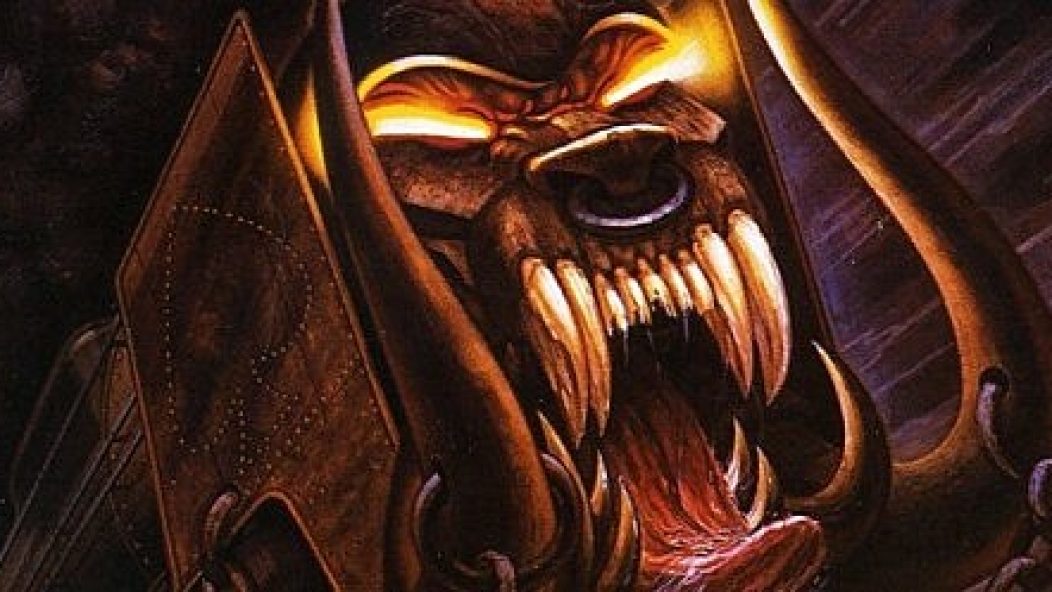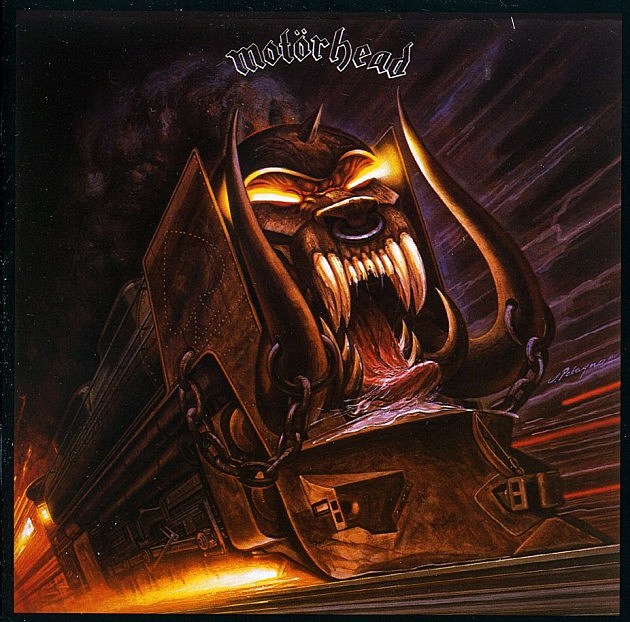
Head Shots: Motörhead

…
Whether it’s due to maturing tastes or shifting allegiances, one’s musical taste can change over time. But what about those bands they signed off on a long time ago? The Headshot gives writers a chance to re-examine bands they don’t like, allowing them to either re-evaluate their opinion or sign off on it once and for all.
…
Until recently, Motörhead’s massive discography was a source of constant embarrassment for me. Inevitably, the band comes up constantly in conversations with heavy music aficionados, and more times than I can count, I’ve been forced to mutter something about “Ace of Spades” being “essential” and Lemmy being “ageless.” I’ve been an obsessive metalhead for over a decade now, but somehow London’s most essential rock trio slipped through the cracks of my musical education.
. . .
Motörhead – “Ace of Spades”
. . .
I suppose the word somehow is a bit disingenuous there. I know exactly how I never became informed about Motörhead’s music: when I first heard it, I hated it, and by the time my tastes came to include bands who wore Motörhead’s influence on their sleeves, I was too stubborn to retroactively give them their day in court. I first got into metal through an extended, exclusive affair with Iron Maiden, and when my collection began to grow, it was with similarly flamboyant acts — King Diamond, Helloween, Blind Guardian, Queensrÿche. Eventually, Metallica and Slayer brought me to At the Gates and In Flames, who brought me to extreme metal as a whole.
Motörhead got left behind. They sang about hard drugs and fast women; I read The Silmarillion and went to bed by 10 so I could rest up for my honors classes. They played loose and rough; I brought Opeth CDs to my guitar teacher. They eschewed crystalline production for a raw edge; I went to Devin Townsend concerts. By senior year of high school, things started to change for me. My taste in metal and the rise of an easily navigable metal-crit Internet had turned me into a voracious consumer of new albums, and a more open-minded listener. When I was most ready for a Motörhead awakening, I saw them open for Judas Priest and Heaven & Hell while on a college visit in Chicago, and they were terrible. As far as I was concerned, they had their chance and they blew it.
But I soon found out it’s difficult to make new metalhead friends if you disdain Motörhead, hence the years of mumbling about “Ace of Spades” and Lemmy’s possible immortality. If you dislike most classic metal bands, you have an out. Maiden is effete. Mercyful Fate is cheesy. Metallica sold out. People will grant you those criticisms and more. Only Black Sabbath and Motörhead are so unimpeachable that even non-metal eavesdroppers will offer their shock and disappointment when you say you dislike them. (Lest you deem me unfit to live, I’ve always loved Black Sabbath.)
. . .
Motörhead – “OVerkill”
. . .
In the last month or so, I’ve decided that enough is enough: I’m going to learn to love Motörhead, or I’m going to die trying. Now, this is a band with 22 full-length albums, so a front-to-back listen of the discography like the esteemed Mr. Casserole did for The Dillinger Escape Plan was never going to be a possibility. The goal was to make me learn to enjoy the music of Lemmy Kilmister and his merry band of boozehounds, not to torture me, Jack Bauer-style, with a full day’s worth of heavy rock riffs. So I was selective, and I listened to the albums that I had heard the most good things about in an attempt to piece together what version of Motörhead I like most. That meant repeated spins of nine albums in all — Overkill, Bomber, Ace of Spades, Iron Fist, Another Perfect Day, Orgasmatron, 1916, March Ör Die, and, to see where they are today, Aftershock. I also tried to get through No Sleep ‘Til Hammersmith, which I understand is a classic, but live albums will always be a tough sell for me. (I can’t even listen to Live After Death in one go.)
What struck me most about my first serious fling with Motörhead was how concise the albums are as artistic statements. None of the albums I spent time with crack the 50-minute mark, and only three even exceed 40. For a band whose discography is a daunting laundry list of album titles you feel like you’ve heard before, the albums themselves aren’t terribly pugnacious. The best of the records feel unified by theme and attitude, even if the overarching Motörhead reputation holds pretty much true for all of them.
. . .
Motörhead – “(We Are) The Road Crew”
. . .
Ace of Spades is a document of hard-livin’, mean SOBs who make their living on the road — “(We Are) The Road Crew” is the best tour life anthem that has ever been written and likely ever will be, but the speed and efficiency with which the rest of the album moves could easily be seen as a metaphor for that same lifestyle. 1916 follows a four-year break and announces Motörhead’s arrival into the postmodern ’90s with their most self-aware release of all. Highlights include Lemmy’s raucous “I’m So Bad (Baby I Don’t Care)” — he doesn’t — and “The One To Sing The Blues” — he won’t be — as well as a minute-and-a-half romp called “Ramones” that cops to Motörhead’s currency with punks being even stronger than with metalheads. Of the albums I listened to, only March Ör Die and Aftershock suffer from inconsistency issues, which can likely be attributed to fatigue on Lemmy’s part. He may want to try an acoustic duet with Ozzy, a Ted Nugent cover, or a played-straight blues song, but that doesn’t make any of those things good ideas.
. . .
Motörhead – “I’m So Bad (Baby I Don’t Care)”
. . .
I also learned that Motörhead traffics in hooks a lot more expertly than I would have expected. Despite the intentional rough edges, just about every album has a few tracks that serve as pretty unfuckwithable hit singles. “Ace of Spades,” “Stone Deaf Forever,” “Orgasmatron,” “Iron Fist,” “Going to Brazil,” and more can sit comfortably alongside the hit songs of more radio-conscious metal acts of the same era, and for that, they tend to hold up better today. To bring Maiden into this yet again, I’d happily go the rest of my life without hearing “Run to the Hills,” but I’ll be damned if I forget the Joker.
. . .
Motörhead – “Orgasmatron”
. . .
Some of my long-held criticisms of Lemmy’s oeuvre hold true, too, but I’m beginning to see the other side of the coin. If a band makes five albums that sound similar, they’re stagnant, but if a band makes 22 albums that sound similar, they have remarkable longevity. Motörhead has been in that vaunted class of elders for years now, and Aftershock is much closer to Overkill than, say, Death Magnetic is to Ride the Lightning or Nostradamus is to Sin After Sin. At this point in their career, that’s something that fans appreciate, not something that makes them pine for something more. Motörhead has run over a lot of the same ground for their entire career, but maybe that’s kind of the point.
I’ve also reconciled with the fact that I’ll never quite be their target audience. Metalheads like me who came to the genre through Maiden, Priest and Fate will probably always have our ears perked up by bands who revere the same escapism, the piercing high vocals, the heroic guitar solos, the lyrics about books we haven’t read and movies we haven’t seen. Many like me have also since developed a taste for the harsh reality portrayed by political thrash and personal hardcore, with gritty musical edges expertly paired with barked brutal truths. Motörhead mash these approaches up with no respect for boundaries. Theirs is an escapist reality, where your real-life troubles disappear not with tales of Gandalf or Satan or with a heightened perspective on those who have it worse, but with rock n’ roll, with whiskey, with riffs. They’re every bit as tough as classic punk and as fun as classic metal, they just take themselves a hell of a lot less seriously than either. And Lemmy is fuckin’ ageless, so they always will.
. . .
Motörhead – “Silence When You Speak To Me”
. . .











